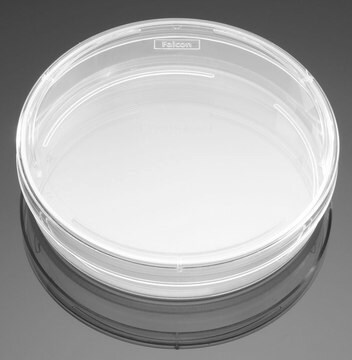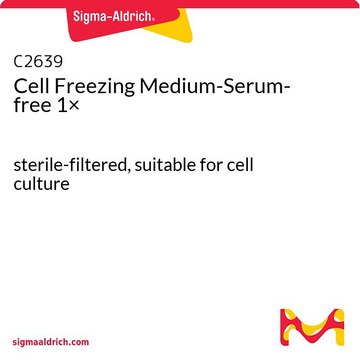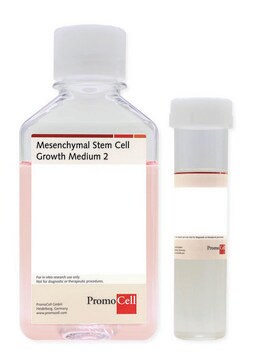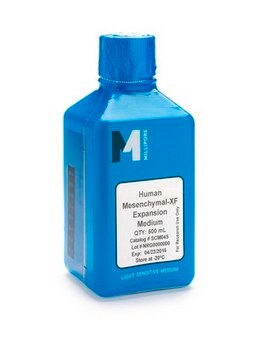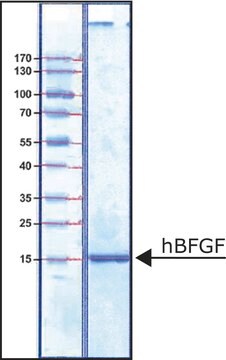SCM016
Mesenchymal Stem Cell Freezing Medium (1x)
The Mesenchymal Stem Cell Freezing Medium (1x) has been optimized & validated for Stem cell culture. This medium is available in a 50ml format.
About This Item
Empfohlene Produkte
Qualitätsniveau
Form
liquid
Hersteller/Markenname
Chemicon®
Methode(n)
cell culture | stem cell: suitable
Aufnahme
sample type mesenchymal stem cell(s)
Versandbedingung
dry ice
Anwendung
2. Cells to be frozen should be in late log phase growth.
3. Monolayers will need to be dissociated. After dissociation, cells are resuspended in Mesenchymal Stem Cell Expansion Medium (Cat. No. SCM015) and counted to determine viability and number.
4. Centrifuge cells at 300 x g for 3 min. Remove the medium above the pellet.
5. Resuspend the cells in Mesenchymall Stem Cell Freezing Medium at a concentration of ~4 x 106 cells/mL. Freeze 1 mL of cells/vial. After the cells have been resuspended and aliquoted into appropriate cryogenic storage vials, they can be placed in a freezing container and the normal freeze down procedure should be started within five minutes.
6. Cells must be stored at or below -80°C. For long term storage the cells should be stored in ultra-low temperature freezer (-150°C), or in liquid nitrogen (-196°C).
7. Thawing of cryopreserved cells should be as follows:
a. Do not thaw the cells until the recommended medium and appropriate plasticware and/or glassware are on hand.
b. Thaw cells quickly in a 37°C water bath. Important: Do not vortex the cells.
c. Sterilize vial by rinsing with 70% ethanol.
d. In a laminar flow hood, use a 1 or 2 mL pipette to transfer the cells to a sterile 15 mL conical tube. Be careful to not introduce any bubbles during the transfer process.
e. Using a 10 mL pipette, slowly add dropwise 9 mL of Mesenchymal Stem Cell Expansion Medium (pre-warmed at 37°C) to the 15 mL conical tube. IMPORTANT: Do not add the whole volume of medium at once to the cells. This may result in decreased cell viability due to osmotic shock.
f. Gently mix the cell suspension by slow pipeting up and down twice. Be careful to not introduce any bubbles. IMPORTANT: Do not vortex the cells.
g. Centrifuge the tube at 300 x g for 2-3 minutes to pellet the cells.
h. Decant as much of the supernatant as possible
i. Resuspend the cells in a total volume of 10 mL of Mesenchymal Stem Cell Expansion Medium (pre-warmed at 37°C).
j. Plate the cell mixture onto a 10-cm tissue culture plate.
k. Incubate the cells at 37°C in a 5% CO2 humidified incubator.
l. The next day, exchange the medium with fresh Mesenchymal Stem Cell Expansion Medium (pre-warmed to 37°C). Exchange with fresh medium every two to three days thereafter.
m. When the cells are approximately 80% confluent, they can be dissociated with Accutase® (Cat. No. SCR005) and passaged or alternatively frozen for later use.
Physikalische Form
Lagerung und Haltbarkeit
Rechtliche Hinweise
Haftungsausschluss
Lagerklassenschlüssel
10 - Combustible liquids
WGK
WGK 1
Flammpunkt (°F)
Not applicable
Flammpunkt (°C)
Not applicable
Analysenzertifikate (COA)
Suchen Sie nach Analysenzertifikate (COA), indem Sie die Lot-/Chargennummer des Produkts eingeben. Lot- und Chargennummern sind auf dem Produktetikett hinter den Wörtern ‘Lot’ oder ‘Batch’ (Lot oder Charge) zu finden.
Besitzen Sie dieses Produkt bereits?
In der Dokumentenbibliothek finden Sie die Dokumentation zu den Produkten, die Sie kürzlich erworben haben.
Kunden haben sich ebenfalls angesehen
Artikel
Development of a novel serum-free and xeno-free human mesenchymal stem cell (MSC) osteocyte differentiation media.
PLTMax® Human Platelet Lysate (hPL) is a superior serum-free and xeno-free media supplement alternative to fetal bovine serum (FBS) for human mesenchymal stem cell (MSC) cultures.
Frequently asked questions about mesenchymal stem cells including MSC derivation, expansion, differentiation and allogenic stem cell therapy.
Protokolle
Information about mesenchyme, specifically mesenchymal stem cell procotols. Step-by-step cell culture protocols for mesenchymal stem cell (MSC) isolation, expansion and differentiation.
Unser Team von Wissenschaftlern verfügt über Erfahrung in allen Forschungsbereichen einschließlich Life Science, Materialwissenschaften, chemischer Synthese, Chromatographie, Analytik und vielen mehr..
Setzen Sie sich mit dem technischen Dienst in Verbindung.



